“Get out of my way!!!” shouted Onetime, my 3 year old son, aggressively to another child recently as he nearly drove his play car over the other child at a local play centre.
Okay – maybe I’m exaggerating a bit about him running the boy over, but the words definitely came out. What a completely mortifying moment – and a teachable one too. And, perfect timing for today’s Teaching Kids About Character post: P is for Politeness.
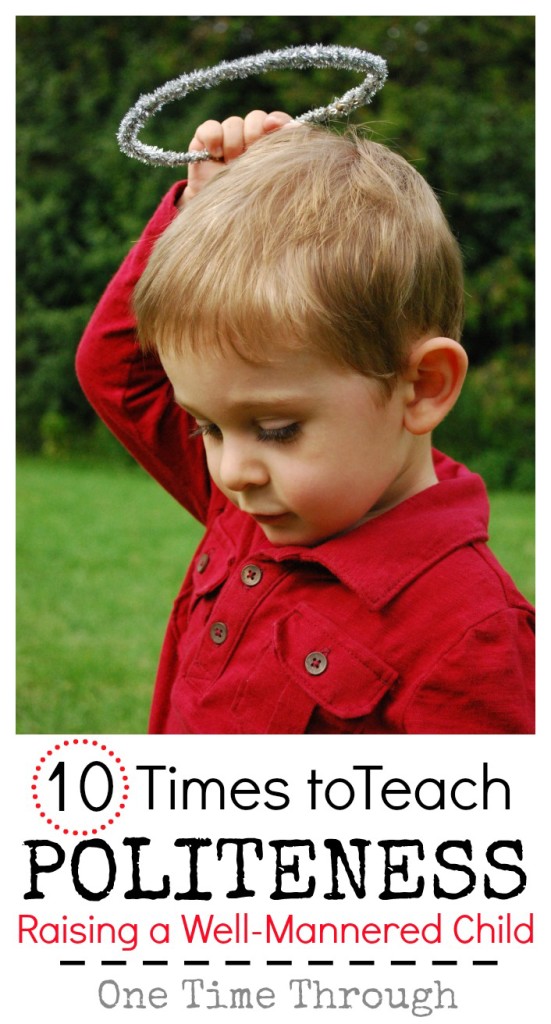
This post contains Amazon Affiliate links. Read more on our Disclosure page.
I was really pleased with my husband’s answer which went something like this…”I pulled him aside immediately and told him, “We say excuse me when we want to get by someone.” Then he had Onetime practise a few times by having him drive in his play car while my husband purposely got in his way.
He made it into a game, and my son got to practise using the more appropriate words to get what he wanted. I thought it was brilliant and gave my husband a big high-5!
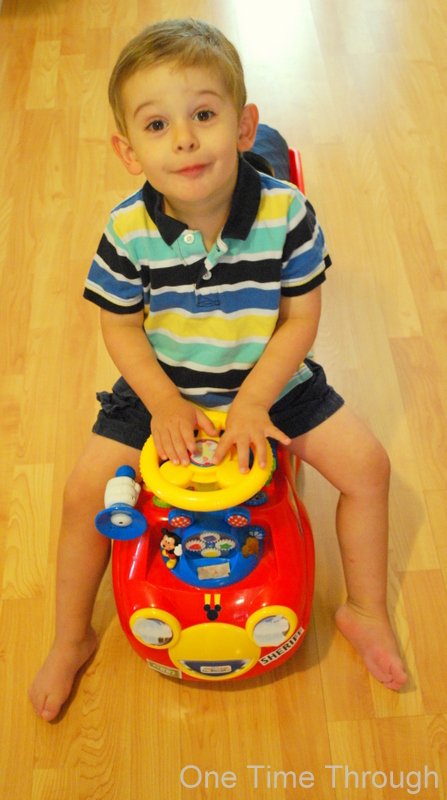
In today’s post, I will list 10 situations to think about when teaching politeness, and some of the strategies I have tried or heard about for addressing them. I know I’ll be missing some things on this list, but these are the biggies we’re dealing with now and have been trying to work on since toddlerhood.
1. Asking with a Please
This is one of those habits that you can develop from an early age. When my son was a baby, I started teaching him sign language to ask for what he wanted, and it was easy enough to add in the please sign after a little while. Now that being said, we’re still working on this one at age 3.
All I do is whenever Onetime asks for something, if he forgets to say please, I say it for him. For example, if he says, “Can I have some more juice Mommy?” I say, “please?” and wait for him to add it in. Then I get him the juice. We are starting to regularly see some really polite asking lately and I know our attention to this one is paying off!
2. Accepting with a Thank You
Such an obvious one – yet I didn’t start really focusing on teaching Onetime to say thank you until he was almost 1 1/2! Definitely waited too long. And we could have started even earlier with sign language. Oops! I’ll file that away until next time.
I remember having a friend over with her toddler son who still wasn’t speaking much yet, and I gave him and my son a snack and I was astounded when out popped “Thank you” from this other boy. I hadn’t heard a peep out of this boy the entire morning, but he knew this social grace already!
Well, I hopped on the bandwagon after that and started prompting for Thank you’s whenever we gave my son something.
I never wanted him to feel bad or guilty about not saying it – I just wanted it to become a habit, so I’ve tried to be very careful about the tone of my voice when I prompt.
I keep it to a plain verbal reminder “Thank you,” after I give him something… if he doesn’t say it first. Again – just like the pleases, we are beginning to hear this one more and more these days without a reminder.
How I address my son giving thanks when someone else gives him something is quite different, though. Instead of prompting him out loud to say “Thank you” for a gift (which can be embarrassing for a child, especially as they get older according to Alfie Kohn), if my son forgets to say it, I say thank you on his behalf. “What a wonderful gift! Thank you so much for finding something Onetime likes.”
I figure this way, my son hears some good modelling of manners, and the gift-giver feels appreciated. A double-win!
Generally, in situations where I know that there will be many gifts (like a birthday party), we have a little chat ahead of time too so that Onetime is reminded to try to remember to give his thanks. To read more about encouraging thankfulness, be sure to read our G is for Grateful post from earlier in our series.
3. Kindly Declining Gifts
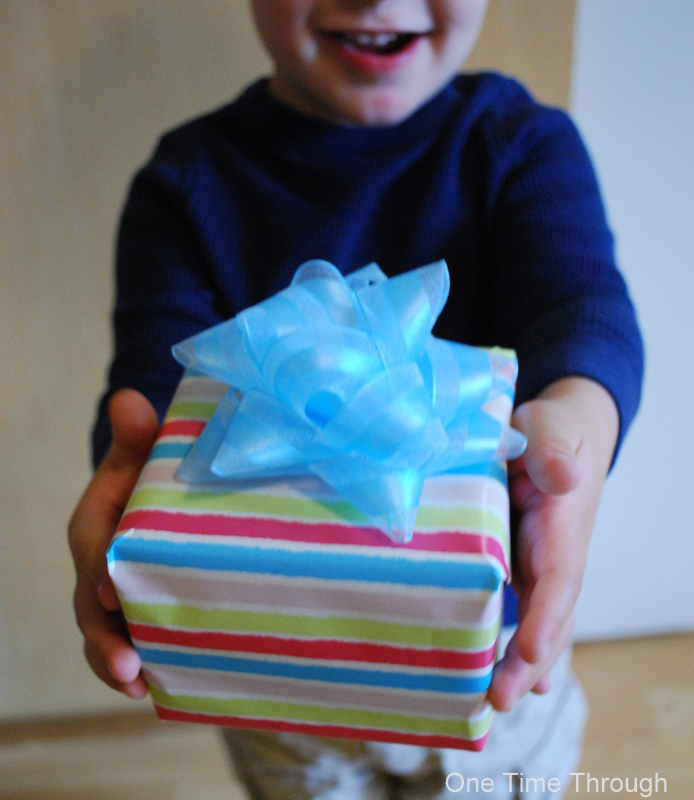
Basically, we’re just approaching this one in the same way as the pleases and thank yous. A gentle verbal reminder when the situation occurs, with an added, “I have a peanut allergy and I’m not sure it’s safe.“
I just wait a few seconds after my son has been offered something to give my son a chance to answer, then I add in any parts that he has left out.
This was a method I was taught to use with autistic preschoolers and brain-injured teens to extend language. It worked for them and eventually, it should work for Onetime.
As an aside, for any kids, this is a useful tool for them to use easily if a stranger asks if they want a treat. If this is a phrase they have practised, it will be much easier for them to turn an offer down and then quickly get away.
4. Interrupting
This is one that’s becoming more of a priority as my son’s language is developing. Doesn’t it seem like whenever you pick up the telephone to have a conversation, your child all of a sudden is desperate for your attention and has to tell you something right away?
I can’t remember where I read about this strategy, but I think it’s a good one and we’re starting to work on it. Basically, the idea is to teach your child to put their hand on your arm when you are talking to someone and they need to tell you something.
To teach this habit, have a chat with your child ahead of time about interrupting. Maybe before you pick up the phone to make a call. Tell them what you want them to do and show them.
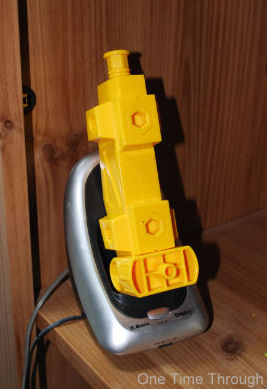
Explain that as soon as you can, you will turn to them and give them your attention. Remind them that they may have to wait for a short time. You could even practise with a couple of pretend calls if you want.
Then put your plan into action. The next time you’re talking with someone, or on the phone, and your child comes running over, don’t stop talking to your friend (otherwise we’re rewarding the interrupting behaviour). Instead, make eye-contact with your child if you can, and guide their hand onto your arm.
It’s probably best to not make your child wait too long the first few times. They need to see that this new habit will actually work after all.
Once your child gets the hang of this little signal, you can start to have them wait a little longer. This one takes lots of practise, but stick with it and it should become a polite habit!
5. Getting Past Someone with Excuse Me
I really can’t add any more to my husband’s wonderful teaching example from the start of the post. Prompting, giving them the right words to use, and then practising should make this one into a habit.
6. Goodbyes
I learned this one from my friend when we were over at her house for a playdate. She prompted her two sons to say, “Thank you for coming over!” when we were about to leave. I thought that was really nice and we have worked on that one ever since, as well as, “Thanks for having me over!“
As an aside, I personally wouldn’t advocate asking your child to give the mandatory hugs and kisses to relatives when it’s time for them to leave. At some point, I read that this can start to give your child mixed messages about affection and their own control over their bodies.
We want our son to give hugs freely and when he feels connected and loving, not because someone is telling him to do it. Can you see the danger in your child learning to follow directions to do these kinds of things?
Instead, we might tell our son in private, “Nan and Grandpa are leaving now. If you want to give them a hug and kiss to say good-bye – now is a good time.” Then it’s his choice and he remains in control of his own body and comfort level.
7. Table Manners
This can be such a huge one for families. So much of what we expect here tends to be from how we were raised and what mealtimes were like when we were kids.
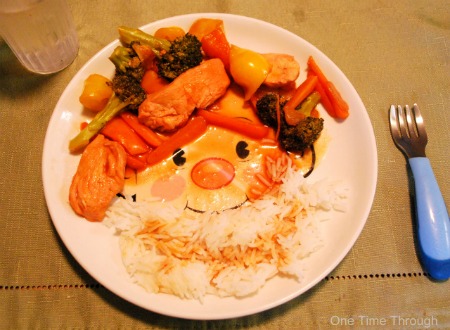
At my house, we try to make mealtime enjoyable. According to Karen Le Billon, author of French Kids Eat Everything, keeping mealtimes fun is more likely to encourage your children to eat better!
We talk about how yummy the food is and about fun things we did that day. We make jokes and get a little goofy sometimes. But, my son is also expected to have basic table manners.
We discourage him from blowing bubbles in his drinks, playing with his food without eating it, and we remind him frequently to finishing chewing before speaking, and to use his utensils instead of his fingers.
When my son is done eating, we have taught him to ask, “May I be excused?” At that point, he is expected to take his plate over to the kitchen counter, and then he can go off and play quietly by himself where we can see him.
Another friend of mine keeps her kids all at the table until everyone is finished, but she provides colouring sheets and crayons for her youngest (age 2 1/2) to keep him busy until they are done eating.
8. Getting What You Want
It seems to be a stage in the preschooler’s language and psychological development for them to start ordering their parents and others around. A few months ago, we noticed one day that Onetime had suddenly started telling my husband and I what to do!
Phrases like, “Daddy, pick me up!” and “Mommy, get my blanky,” were becoming commonplace. He was becoming a little drill sargeant, and it was time to start teaching him that you can catch more flies with honey than with vinegar!
Basically, I started teaching him to rephrase his wishes into a question. When he would say, “Mommy, get my blanky.” I would respond with, “Mommy, can you get my blanky, please?” Then I would wait until he rephrased his initial command into a question. After he asked nicely, I would get him the blanky.
That being said, I don’t always do what he asks me to do. Sometimes, I can’t, or don’t want to, and I tell him as much! But, most of the time, because I want to reinforce his politeness, I will help him out – just to show him that the way he asks can make all the difference in gaining someone’s cooperation.
9. Needing Space
This is a tough one for kids to be polite about. Sometimes when they are feeling crowded, kids will come out swinging and shouting!
A year or so ago I read about a simple phrase that you can teach your child to use when they want privacy or feel crowded. “I need more space.” Simple as that.
I started prompting Onetime to say this when he was a toddler. Any time that I would see from his face that he was feeling uncomfortable with the noise level around him, or his personal space was being invaded, I would say the words for him to the surrounding children.
As a preschooler, he says it himself now about 75% of the time – sometimes loudly! But, it’s still more polite than “Get out of my way!” or yelling something else! To read more about teaching this phrase, check out our F is for Friendly post.
 10. Appropriate Talk
10. Appropriate Talk
Hopefully, you haven’t experienced the need to teach this lesson yet! It’s almost an inevitable one though. At some point, your sweet little cherub is going to pop out an unexpected expletive and you’re either going to kick yourself for saying it within their hearing range, or wonder where in the heck they heard it from!
The best advice I have found for addressing this one is in Judy Arnall’s book Discipline Without Distress. By the way, I love her book and have found it extremely useful for dealing with all sorts of challenging behaviours. To read a review of her book, click here.
Basically Judy advises you to let your child know that that language is undesirable and unacceptable with your family. She also suggests teaching kids a replacement word for the swear-word, if they have used it properly in context while frustrated or angry. We are teaching Onetime to say, “Darn!” or “I’m frustrated.“
Unfortunately, Onetime has let loose a few swear words that he has overheard. And it was both embarrassing and (I have to admit) sort of funny at the same time.
At one point, he latched onto the word “Damn” that he overheard from a visitor and began chanting it over and over with glee while doing a little dance too! I swear he actually has a radar for picking up on the ONE word that he shouldn’t be repeating.
Anyway – although tempted to laugh, we didn’t – and after briefly explaining that that was not an acceptable word for him to use, we ignored his little dance. Eventually, it petered out from lack of attention, and the word hasn’t come up again.
Now there have been other incidences where Onetime has latched onto some strange words – probably because they get a reaction. My son is a little ham who likes to make people laugh, and he’ll go with what works!
Lately, it’s been the word “vomit” and “cigarettes.” He likes to shoot out “vomit” randomly at strange times, and has created a little repeating chant for the word “cigarettes” which is actually quite catchy! (I caught myself chanting it under my breath yesterday while making dinner.)
Although, both of these words are not swear words, they are inappropriate (not to mention embarrassing) for him to be chanting and shouting out. After getting too much attention for using them the first few times (“What – vomit? Why are you saying that? Are you going to throw up? Are you feeling okay?”), they’ve been a little harder to extinguish than the “Damn” scenario. And my husband and I have learned our lesson! No more laughing at these kinds of things.
I am confident though, that by not over-reacting, and just briefly explaining that these are not appropriate things to shout out, Onetime will come to lose interest in saying them and he’ll find another way to make us laugh!
Punishing him for saying these things doesn’t make sense to me, because he’s only 3 and is just experimenting with the power of language. I would rather him learn from our bored reactions, than try to time-out his speech “experiments.”
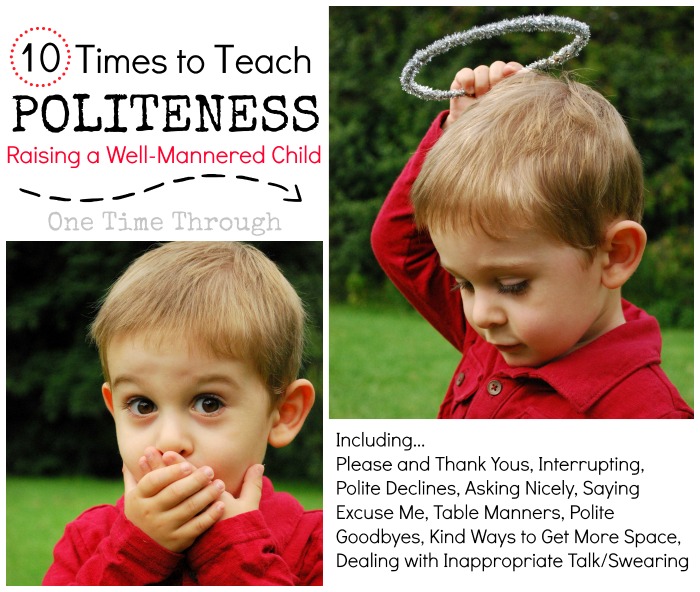
If we want politeness to become a habit, we have to be on top of these things so our kids get a consistent message about the importance of these social graces. That being said, we all do the best we can and sometimes 75% of the time is good enough!
To a well-mannered future,
To find all our posts, listed below, be sure to visit the Character Series page.
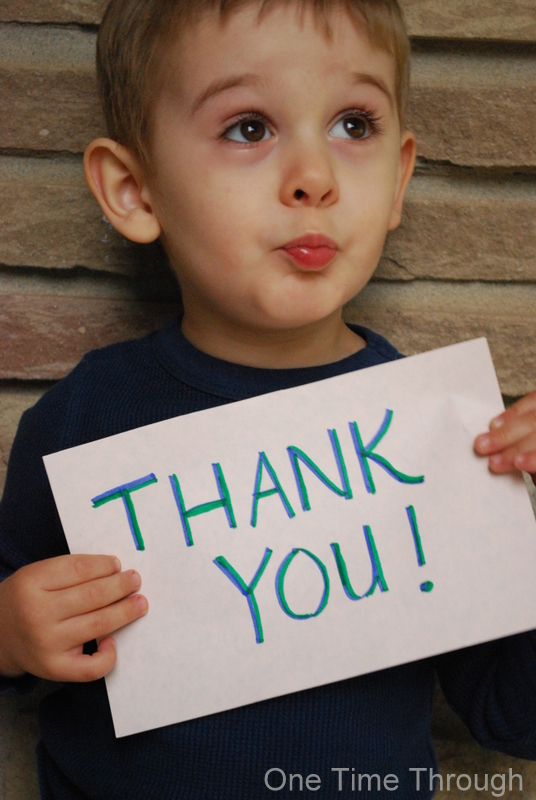
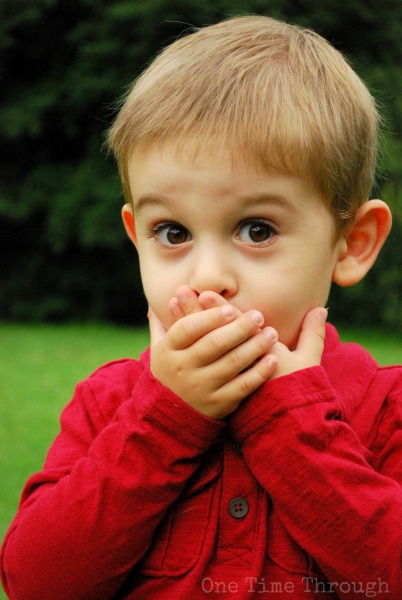

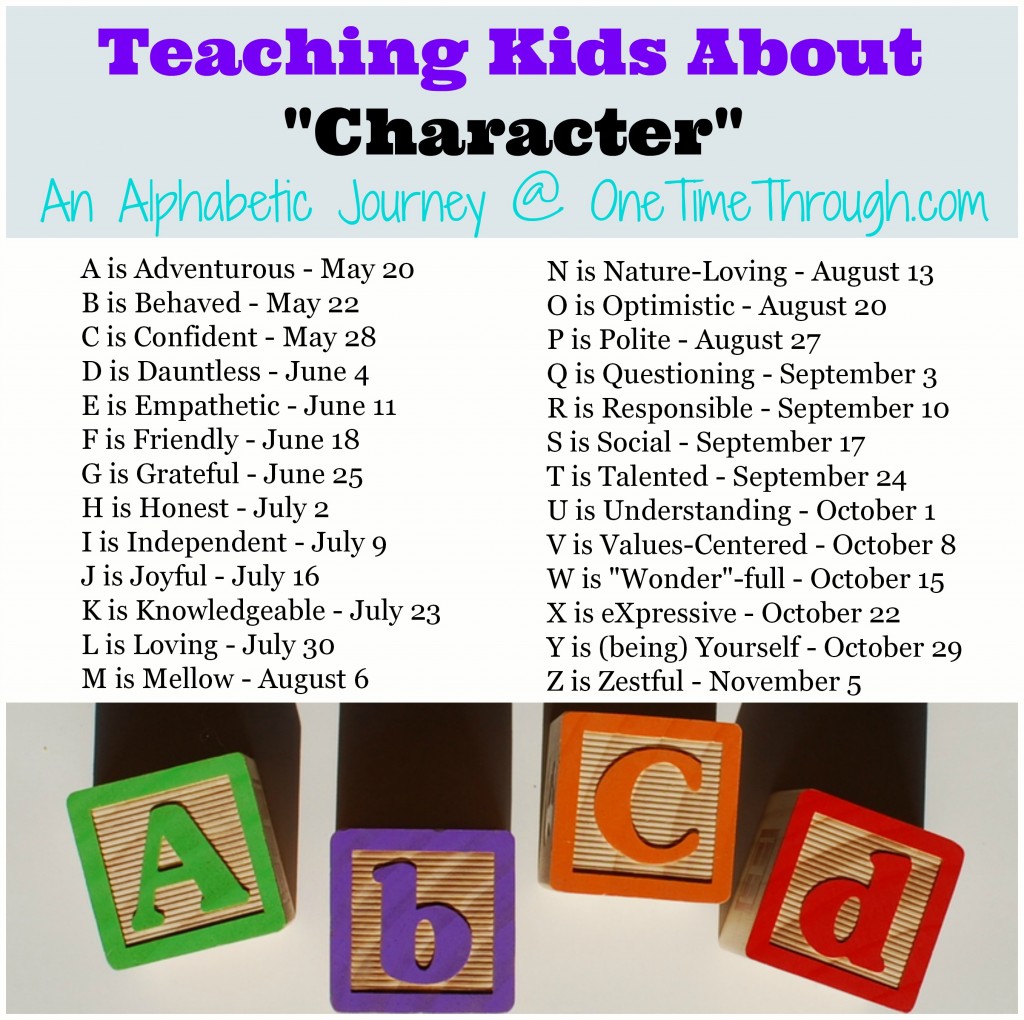
My son loves pushing the cart in the supermarkets and I definitely need to work on him saying excuse me – rather than a full bang – when he manoeuvers around people in the aisles! #alphabetphoto
Oh – too funny! Yep – something to work on for sure. Gotta love his enthusiasm though! LOL
We are working hard on the table manners. He is a wanderer and I wish that I can just make him sit still on a table for a wee bit longer. Hopefully we will get there =) #alphabetphoto
Yep – that’s a tough one Merlinda! I’ve discussed this same issue with a few of my friends and we all have different approaches! He’ll get there eventually! Thanks for dropping by. Best, Sue
So many great tips Sue – thank you for sharing. We’ve discovered that POD is far more polite with others than she is with us, I’m sure that’s typical though. Need to work on a few things but she’s doing alright #alphabetphoto
Oh yes – of course! Isn’t that always the way? Although, it could be worse. Thanks for dropping by Charly Dove!
Best
I really love how you made learning about politeness easy for your son to learn. The car activity is awesome!
Thanks so much for dropping by JDaniel4’s Mom! I was really proud of my husband with the car thing – he’s a natural teacher. Best, Sue